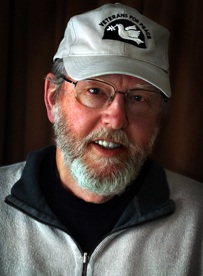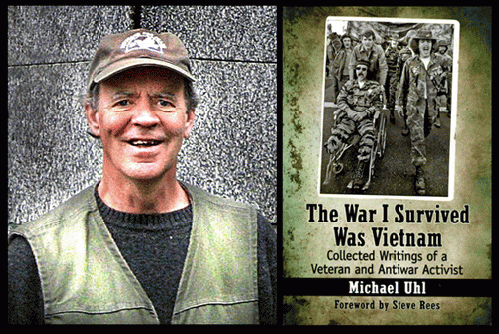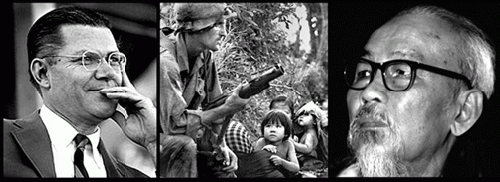The War I Survived Was Vietnam: Collected Writings of a Veteran and Antiwar Activist
By Michael Uhl
McFarland Publishers
The journalistic "beat" that Michael Uhl covered over the years in the essays and reviews collected in his just-published anthology of short works is that realm of thought that survives the relentless American capacity for forgetting history. You can look at a book like this as a tool of memory, in this case, focused on the Vietnam War from the perspective of a veteran who came to see his war as a shameful war of aggression and a crime.
This war on memory began during the war and is on-going now. "The GI resistance and antiwar Vietnam veteran's movements of the Sixties and Seventies, so unique in the annals of warfare, became prime targets for erasure in this new and approved version of the war the Pentagon hopes to fashion." This is from a 2012 essay on the Pentagon's 13-year, multi-million dollar program to sanitize the Vietnam War known as the 50th Commemoration Project, which was launched that year with a speech by President Obama at the Vietnam Wall in Washington D.C.
The Vietnam War will always be controversial and subject to politics. "But the specific history of the organized opposition to the war is more vulnerable." Uhl is referring to the political opposition mounted by veterans of the war like himself, a young intelligence officer. Moral opposition by veterans becomes "more and more abstract and remote to younger generations as it recedes into the past." For veterans of the war like Uhl, none of it is "abstract" or "remote." They began building a moral case against the war when they found themselves trapped in it. When they returned to "the world" they took their case up in the streets and in the halls of government.
Uhl does not accept President Obama's "consoling fiction that Vietnam Veterans as a whole 'were blamed for the misdeeds of a few.' " We all know the drill: Although bad things happen in all wars; the Vietnam War was a noble cause. Uhl's response is direct: "I am too wedded to my own truths about the evils of that war to ever be consoled, and Obama's lies on this particular occasion infuriate me. I went to Vietnam. I lived the war. It horrified me. I came home and actively opposed it. Like tens of thousands of other Vietnam veterans, I witnessed or participated in atrocities. I saw the routine use of torture. These were not the 'misdeeds of a few': they were the essence of that war."
With the ascendancy of Donald Trump, torture is again front and center on the American agenda. Think logically: If one is going to "make America great again," one can't be worried about having broken some furniture in Vietnam a half century ago. Here's Donald Rumsfeld on the Iraq War: "Freedom's untidy, and free people are free to make mistakes and commit crimes and do bad things. Stuff happens." The fact is, regime change didn't work in Vietnam, and it has never worked well anywhere, except in backwater places in the early 1950s like Iran and Guatemala, where the tactical use of disinformation (the "fake news" of the time) was effective. Regime change backfired in Iraq; it didn't work in Libya, and it's a US debacle in Syria.
Uhl wrote a memoir called Vietnam Awakening: My Journey From Combat to the Citizens' Commission of Inquiry on the U.S. War Crimes in Vietnam. Both books are published by McFarland Publishing. McFarland is not in the bestseller business. Instead of indulging the popular American market for sensationalist "war stories," McFarland has a loftier goal; it markets its books to individuals, libraries and other venues out of a sense of witness and keeping the record complete. I see it like those monks back in the Dark Ages who memorized and hand printed books so that their contents would not disappear forever into a black hole.
Anyone who defends the honor of the Vietnam War should be asked to answer one question: What (be specific) did the Vietnamese ever do to us here in the United States that justified an invasion and a ten-year-plus military occupation that killed millions, polluted the ecosystem and food supply and set the resourceful nation and people back decades? We know about the Cold War and how Truman, Eisenhower and the rest had to keep the communist yellow peril in check lest -- what? -- they invade California? Fluoridate our water? Destroy our vital bodily fluids? Was the United States of America that weak and vulnerable? Or were we, instead, that arrogant? What the Vietnamese asked from the United States was simple: They wanted French colonialists off their backs, and when they beat the French in 1954, they wanted the United States to leave them alone. A forgotten fact of history: Ho Chi Minh and his Viet Minh were our allies in WWII against the Japanese. Long an enemy of China, what the Vietnamese really wanted was for the US to treat them like we treated the Tito regime in Yugoslavia -- with a spirit of neutrality. Of course, the Vietnamese are now part of the Asian capitalist miracle, what some have called "the rise of the rest."
The title McFarland gave Uhl's anthology seems a bit awkward. But, then, the more I thought about it, the more I concluded maybe that's a good thing. I Survived the Vietnam War may be more direct, but it characterizes survival as a personal accomplishment. Shifting the words around to The War I Survived Was Vietnam subtly stresses the war itself as something problematic to be survived. What Uhl is consistently writing about is moral survival, not physical survival. Veterans like Uhl survived the war morally because they insisted (and still insist) on the grotesque immorality of what they found themselves compelled against their will to do. Each and every day Vietnam veterans like Uhl "survive" their war by having the courage to say the emperor has no clothes.
The anthology starts with featured articles from The Nation and elsewhere. There's a 1994 Nation piece on the MIA issue, which is notable for the fact the number of US missing is miniscule compared to missing Vietnamese. When Uhl and his partner Carol Brightman are visiting the Hanoi Military Museum, she runs into a US Air Force master sergeant, there for some MIA accounting mission. She chats him up and asks why we in the US are so hung up about the POW/MIA issue. The man's answer: "Because we lost. We're sore losers." It doesn't get more direct and on-the-money than that. It explains why the war has become such a political football. As Uhl nicely explains, the Vietnamese understood that "Washington needed to save face." This kind of empathetic understanding helped Washington get over an obsession with only its own missing and encouraged working with the Vietnamese on their massive numbers of missing. Many Vietnamese soldiers were killed and bulldozed en-mass into huge pits. According to Vietnamese spirituality, the unburied (ie the missing) are wandering ghosts. In this spirit, Vietnam Veterans of America encouraged its members to return war souvenirs to Vietnam.
In a review/essay on Robert McNamara's book In Retrospect: The Tragedy and Lessons of Vietnam, Uhl and co-writer Carol Brightman interview McNamara. The exasperating truth here is, bombing devotees like McNamara (he helped develop carpet bombing in WWII) understood the Vietnam War was not winnable in the mid 1960s. Yet to save face it went on slaughtering Vietnamese for ten more years! They describe "McNamara's tendency to speak out of both sides of his mouth, as if penitent and apologist are grappling for control." So, I suppose, one has to give McNamara some credit; at least he's somewhat morally torn by his role in it all. I'm reminded of the true story of the Vietnam vet who encountered McNamara on a Martha's Vineyard ferry late one foggy night and, after some conversation, tried to throw him off the boat -- only to be saved by a deckhand. McNamara didn't press charges.
There are several essays on Post Traumatic Stress Disorder, or PTSD, a necessary topic in any discussion of Vietnam. All wars mess up people's minds; but immoral wars really mess up people minds. Uhl witnessed torture and other things that don't sit well in his conscience. I know too many vets who had to absorb and make sense of horrible things made only worse by the moral dubiousness of the war. If you're fighting for the liberty of your country or your people, that's one thing; if you're fighting to break the back of a peasant culture that never did anything against you, that's another.
In another essay, Uhl is critical of the great Seymour Hersh for suggesting Abu Ghraib was something new. Torture and cruelty are the common denominators of war, and they certainly were given free rein in Vietnam. "Affixing primary responsibility for atrocities that are hardwired into modern wars of 'counterinsurgency' onto the lowest-ranking soldiers, those tasked with carrying out the dirty work, while limiting the culpability of the command, is yet another echo from the My Lai massacre that resonates with Abu Ghraib."
There's a fine personal essay in which Uhl engages with a war buddy with his share of PTSD and women trouble. The man tells of being attacked by war protesters in Seattle when he returned home. C'mon, Bob, it's been shown this stuff never really happened, Uhl says. Bob insists it did. Uhl then does some research and realizes Bob was part of big PR show "return" of a unit from Vietnam in July 1969. At McCord AFB in Washington state the ceremony is indeed interrupted by protesters chanting, "Bring them all home now!" Uhl logically concludes that this "jeer" is focused not on the common soldier, but at military brass and US political leaders. Sure, human nature being what it is, "Bob felt like he was being jeered, and I'll bet that was how most of the other GIs felt that day." Still, Bob wouldn't let go of what Uhl tries to convince him is a misunderstanding of events. Uhl's conclusion: "Class resentment runs deep and gets tragically misplaced in this society, while divide and rule fuels the myth that vets were spat upon, even when they weren't."
(Note: You can view every article as one long page if you sign up as an Advocate Member, or higher).






